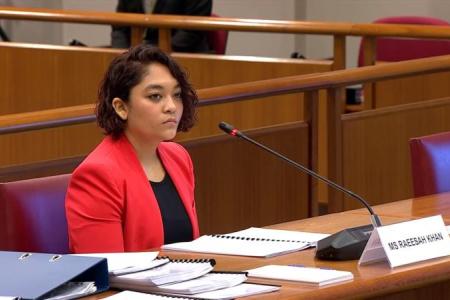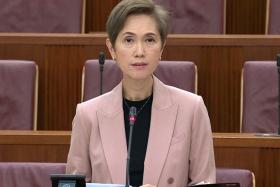Privileges committee has thoroughly investigated complaint against Raeesah Khan: Tan Chuan-Jin
Parliament's privileges committee has thoroughly investigated the complaint against former Workers' Party MP Raeesah Khan for lying in the House, and will present its findings and recommendations in due course, Speaker of Parliament Tan Chuan-Jin has said.
He added that the Committee of Privileges takes any formal complaint seriously, and has a responsibility to look into such complaints to uphold the sanctity and integrity of parliamentary privilege.
He made the remarks on Monday (Jan 3) in a blog post taking stock of the past year in which Parliament passed 39 Bills and also introduced live streaming of sittings for the first time.
The Committee of Privileges had been holding hearings in December to look into the conduct of Ms Khan, after she admitted to lying in Parliament during a speech on Aug 3.
She had said she accompanied a sexual assault victim to the police station, and that the woman had been driven to tears by the insensitive questions of the police.
But on Nov 1, she confessed that she heard the anecdote in a support group. She stepped down as an MP on Nov 30.
Mr Tan reminded MPs that while parliamentary privilege allows them to speak freely and frankly in the House without the fear of legal consequences, "the onus also lies with every MP to apply due diligence and responsibility even as we exercise this privilege".
"Statements made must be based on facts or well-substantiated information," he said.
"The recent complaint that we looked at... is an important reminder that MPs must not wilfully abuse the immunity and privileges being an MP accords them."
The Committee of Privileges is one of the Standing Select Committees which are an important feature of Parliament's functions, said Mr Tan.
Such committees also perform the critical and inquisitorial role of scrutinising the Budget, among other things, he added.
Mr Tan noted that Parliament had had a busy year in 2021, and it came as no surprise that the House also set the record for the longest sitting ever had.
The marathon debate on Singapore's foreign talent policy had stretched from 11am on Sept 14 to 12.30am on Sept 15, clocking in at 13.5 hours.
"In fact, two MPs born on these respective dates ushered in their birthdays in the Chamber!" said Mr Tan on the debate over the motion by Finance Minister Lawrence Wong on securing Singaporeans' jobs and livelihoods, and a competing motion by Progress Singapore Party (PSP) member Leong Mun Wai.
Amid the Covid-19 pandemic and the safe management measures adopted in the House - such as having MPs set a few seats apart and speaking behind glass screens - MPs had raised and got responses to 2,601 parliamentary questions.
They also tabled 17 adjournment motions, allowing them to speak for up to 20 minutes on issues ranging from support for local hawkers, to the plight of Singaporeans with rare diseases.
The House passed 39 Bills, took decisions on 12 substantive motions, and heard 11 ministerial statements on matters of public importance and debated three of them.
Citing these statistics, Mr Tan added: "I am heartened by how Members of the 14th Parliament of Singapore had conducted themselves with proper dignity and decorum as they engaged in robust and lively debates on the issues that matter to their constituents and citizens."
In 2021, Parliament also introduced live streaming of its sittings, starting from January, giving citizens and stakeholders another platform to directly access and keep current on what the Government and the MPs are debating, on top of existing options like the Hansard verbatim transcripts of debates.
The Parliament Secretariat also continued its outreach to the public to demystify parliamentary procedures and processes, growing its social media followers, said Mr Tan.
"Together, these platforms and initiatives are complementary levers in helping the public and our citizens better understand the essential role that Parliament plays in lawmaking and in keeping the Government accountable for its actions, policies, and finances," he added.
"We hope these iterative efforts will also enable our stakeholders to better appreciate the complexities and trade-offs that go hand-in-hand with law- and policy-making. These efforts also help to maintain and reinforce public trust and confidence in Parliament and the parliamentary process."
Get The New Paper on your phone with the free TNP app. Download from the Apple App Store or Google Play Store now


